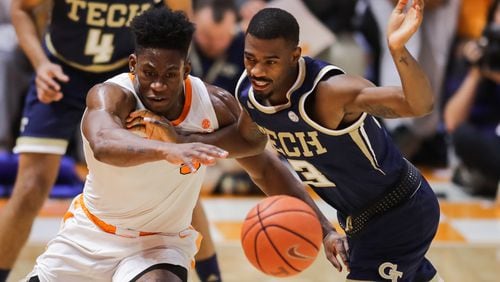Georgia Tech’s record going into its Wednesday night ACC-Big Ten Challenge game at Northwestern is what would be expected – 4-1. The Yellow Jackets have wins against four lower-tier opponents and a loss to No. 6 Tennessee. On their own, those results wouldn’t cause anyone to stray from Tech’s projections to finish near the bottom of the ACC.
However, the manner in which Tech has played in those games – particularly on defense – suggests more may be possible. To that end, the Jackets’ game against Northwestern and Saturday against St. John’s in a neutral-site game in Miami should offer more insight into their potential.
“We’ll know a lot about our team after this week,” coach Josh Pastner said Tuesday.
Northwestern and St. John’s probably wouldn’t equate to the highest caliber of ACC competition, but they’re still tests. The Wildcats, who finished last season at 15-17 (including a last-second loss to Tech), were picked to finish in the bottom half of the Big Ten but have started the season 5-1. St. John’s was picked to finish fourth in the Big East and has started the season 5-0 with wins over California and Rutgers, two so-so power-conference teams.
“Everyone here knows it’s really what you do during ACC play that’s going to determine how everyone views our season,” Pastner said. “This league is just so good. But this (Northwestern and St. John’s) is who you’re playing against pretty much every night once we get to January.”
Tech does not have Ben Lammers, who was named ACC defensive player of the year in 2017, and Josh Okogie, who left Tech early to become a first-round pick, but has done effective work thus far on defense.
Through Monday’s games, Tech was rated 14th in adjusted defensive efficiency (KenPom). When they played Texas Rio Grande Valley, the Jackets held the Vaqueros to 44 points. It was the fewest points scored against Tech since the 2012-13 season. The Jackets lead the ACC in field-goal percentage defense (34.7 percent).
Tech is playing more man defense than in Pastner’s first two seasons and using full-court pressure, which it rarely did, if ever. With a roster that is deeper and more athletic, notably transfer James Banks and freshman guard Michael Devoe, Pastner is adjusting the style with encouraging results.
“I do like our second and third effort,” Pastner said. “That’s been the biggest thing, our multiple-effort plays on the defensive end, our scramble situations, our rotations have been pretty good.”
Tech’s most significant game thus far may have been its 66-53 loss to the Volunteers on Nov. 13. The Jackets held Tennessee to .95 points per possession, posting a better number than Louisville and No. 2 Kansas did against the Volunteers. In fact, in all of last season, when the Volunteers were 26-9, only six teams held them to a lower points-per-possession rate.
“That was probably the hardest I’ve seen Georgia Tech play in the past three times we’ve played them, and they did a good job fighting,” Tennessee forward Grant Williams said after the game.
In Pastner’s first season, it was the Jackets’ defense that they rode to their surprising 21-win total and berth in the NIT final. That team’s offense ranked 259th in adjusted offensive efficiency, but ranked sixth in adjusted defensive efficiency.
“I think our team’s going to continue to get better, and they’re going to play hard, and you see that through our defensive numbers that they’re going to do that,” Pastner said.
Through five games, Tech has run hot and cold on offense, relying heavily on its 3-point shooting. The Jackets have shot 40 percent or higher in two games and below 30 percent in the other three games. Alston has made 7 of 11 3-point tries (64 percent).
To Alston, the Tennessee game showed “that we can compete with the top 10’s in the country,” he said. “... We’ve got to carry it on and get a win.”
They’ll have two chances to do so this week.







